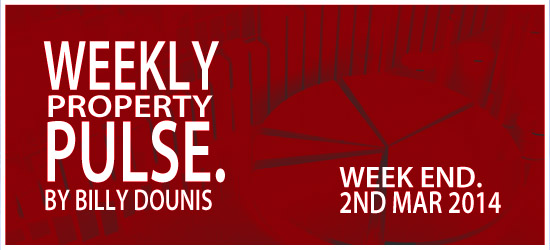Weekly Property Pulse
Cameron Fisher | 3rd March, 2014

Should Price Guides be Banned on Auction Properties?
The Queensland governmentŌĆÖs plan to ban the disclosure of price guides for auction properties is causing some angst between industry leaders in QLD and NSW.
Under the Property Occupations Bill ŌĆō introduced to parliament in November last year ŌĆō the use of price guides and the disclosure of reserve prices in Queensland property auctions will be prohibited.
ŌĆ£Currently in Queensland it is common practice for real estate agents to market an auction property with no price guide or likely sale price indication,ŌĆØ Mr Kardash, REIQ chief executive said.
ŌĆ£The market will decide on the day of auction what it is prepared to pay for that particular asset.ŌĆØ he added.
The Real Estate Institute of NSW (REINSW) has voiced its disapproval of the law, with the organisation’s president, Malcolm Gunning, claiming the ban on auction price guides “would cause havoc for those interested in buying property in Queensland”.
ŌĆ£It is a step backward for consumers,” he said. “Now more than ever buyers are demanding transparency in regard to property. To take away price guidelines will turn back the clock on Queensland real estate.”
The conversation around price is an imperative part of the sales process and transparency should be the key to unlocking any disputes between buyers and agents, the vendorŌĆÖs expectations and reserve price is likely to shift throughout the campaign based on the buyer feedback and interest in the property.
ItŌĆÖs believed that there is a common consensus that often occasions that arise where the conduct of the agents has been somewhat misleading and deceptive and this behaviour should be delft with accordingly, however the property market is driven by supply and demand and in a ŌĆśboomingŌĆÖ with high clearance rates and loads of competitive buyers about, it appears that the marketplace [demand for property] is paying its own price;
Let me give you an example of how and why I believe the auction process sometimes attracts a negative stigmaŌĆ”
A property goes up for auction. The agent advises the vendor of their suggested pricing strategy and potential value based on comparable sales and the individual features of the property, based on this evidence the vendor and agent agree to a price guide between $1.1M – $1.2M ŌĆō which at this point in time is in line with vendor expectations and market conditions.
Three and a half weeks on the market and 3 days out from auction, the interest in the home has been exceptional with a number of people expressing interest in the property and are likely to bid.
Meanwhile all this feedback throughout the campaign has been passed on the vendor and they are now in a position to make an educated and informed decision of where to set their reserve price (often set 1-3 days out from auction day) this decision is solely up to the vendor and will change throughout the course of the auction campaign ŌĆō although may not always be shared honestly with the agent ŌĆō So the vendor sets their reserve price at $1.35M.
Auction day is here and the bidding stalls at $1.325M (significantly above the guide that was initially placed on the property when it went to market and where the sales based evidence suggested the propertyŌĆÖs value lays) from here the auctioneer stops the auction and asks the agent to seek the vendorŌĆÖs instructions ŌĆō As IŌĆÖm sure you can imagine at this point there are a lot of confused and disgruntled buyers in the room ŌĆō After the agent seeks his instructions the property is then sold to this bidder.
This happens every weekend, there are buyers out feeling disappointed and ŌĆśmisleadŌĆÖ when in fact what we are seeing the result of a well marketed property and a competitive marketplace.
Although the QLD governments proposal has some merit in theory to ŌĆō eradicate the use of price guides ŌĆō this will not stop buyers feeling mislead and disappointed on auction day and current laws should be enforced before there is more red tape strangling the life out of the industry.
Auction Clarence Rates:
Sydney: 83%
Melbourne: 76%
Brisbane: 33%
Adelaide: 71%
(*Source APM)





Leave a Reply